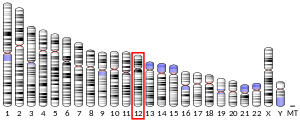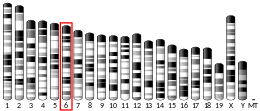CLEC7A
C-type lectin domain family 7 member A or Dectin-1 is a protein that in humans is encoded by the CLEC7A gene.[5] CLEC7A is a member of the C-type lectin/C-type lectin-like domain (CTL/CTLD) superfamily. The encoded glycoprotein is a small type II membrane receptor with an extracellular C-type lectin-like domain fold and a cytoplasmic domain with a partial immunoreceptor tyrosine-based activation motif. It functions as a pattern-recognition receptor for a variety of β-1,3-linked and β-1,6-linked glucans from fungi and plants, and in this way plays a role in innate immune response. Expression is found on myeloid dendritic cells, monocytes, macrophages and B cells. Alternate transcriptional splice variants, encoding different isoforms, have been characterized. This gene is closely linked to other CTL/CTLD superfamily members on chromosome 12p13 in the natural killer gene complex region.[5]
Structure
Dectin-1 is a transmembrane protein containing an immunoreceptor tyrosine-based activation (ITAM)-like motif in its intracellular tail (which is involved in cellular activation) and one C-type lectin-like domain (carbohydrate-recognition domain, CRD) in the extracellular region (which recognizes β-glucans and endogenous ligands on T cells). The CRD is separated from the membrane by a stalk region. CLEC7A contains putative N-linked sites of glycosylation in the stalk region.[6][7]
CLEC7A is expressed by macrophages, neutrophils and dendritic cells.[8] Expression has also been studied on other immune cells including eosinophils and B cells.[9]
Function
The C-type lectin receptors are class of signalling pattern recognition receptors which are involved in antifungal immunity, but also play important roles in immune responses to other pathogens such as bacteria, viruses and nematodes.[6] As a member of this receptor family, dectin-1 recognizes β-glucans and carbohydrates found in fungal cell walls, some bacteria and plants, but may also recognize other unidentified molecules (endogenous ligand on T-cells and ligand on mycobacteria).[6] Ligand binding induces intracellular signalling via the ITAM-like motif. CLEC7A can induce both Syk dependent or Syk independent pathways. Dimerization of dectin-1 upon ligand binding leads to tyrosine phosphorylation by Src family kinases and recruitment of Syk. Syk activates transcription factor NFκB. This transcription factor is responsible for the production of numerous inflammatory cytokines[9] and chemokines such as TNF, IL-23, IL-6, IL-2. Other responses include: respiratory burst, production of arachidonic acid metabolites, dendritic cell maturation, and phagocytosis of the ligand.[10]
Antifungal immunity
CLEC7A has been shown to recognize species of several fungal genera, including Saccharomyces, Candida, Pneumocystis, Coccidioides, Penicillium and others. Recognition of these organisms triggers many protective pathways, such as fungal uptake by phagocytosis and killing via hypochlorite generation. Activation of dectin-1 also triggers expression of many protecting antifungal cytokines and chemokines (TNF, CXCL2, IL-1b, IL-1a, CCL3, GM-CSF, G-CSF and IL-6) and the development of Th17.[10]
Histoplasma capsulatum can evade recognition of β-glucan via CLEC7A on phagocytic cells by secreting an enzyme that removes exposed β-glucans or by masking the β-glucan with α-glucan.[11]
Co-stimulatory molecule
Also operating as a co-stimulatory molecule via recognition of an endogenous ligand on T-cells, which leads to cellular activation and proliferation, CLEC7A can bind both CD4+ and CD8+ T cells.[10]
References
- GRCh38: Ensembl release 89: ENSG00000172243 - Ensembl, May 2017
- GRCm38: Ensembl release 89: ENSMUSG00000079293 - Ensembl, May 2017
- "Human PubMed Reference:". National Center for Biotechnology Information, U.S. National Library of Medicine.
- "Mouse PubMed Reference:". National Center for Biotechnology Information, U.S. National Library of Medicine.
- "Entrez Gene: CLEC7A C-type lectin domain family 7, member A".
- Drummond RA, Brown GD (August 2011). "The role of Dectin-1 in the host defence against fungal infections". Current Opinion in Microbiology. 14 (4): 392–9. doi:10.1016/j.mib.2011.07.001. PMID 21803640.
- Brown J, O'Callaghan CA, Marshall AS, Gilbert RJ, Siebold C, Gordon S, et al. (June 2007). "Structure of the fungal beta-glucan-binding immune receptor dectin-1: implications for function". Protein Science. 16 (6): 1042–52. doi:10.1110/ps.072791207. PMC 2206667. PMID 17473009.
- Taylor PR, Brown GD, Reid DM, Willment JA, Martinez-Pomares L, Gordon S, Wong SY (October 2002). "The beta-glucan receptor, dectin-1, is predominantly expressed on the surface of cells of the monocyte/macrophage and neutrophil lineages". Journal of Immunology. 169 (7): 3876–82. doi:10.4049/jimmunol.169.7.3876. PMID 12244185.
- Saijo S, Iwakura Y (August 2011). "Dectin-1 and Dectin-2 in innate immunity against fungi". International Immunology. 23 (8): 467–72. doi:10.1093/intimm/dxr046. PMID 21677049.
- Huysamen C, Brown GD (January 2009). "The fungal pattern recognition receptor, Dectin-1, and the associated cluster of C-type lectin-like receptors". FEMS Microbiology Letters. 290 (2): 121–8. doi:10.1111/j.1574-6968.2008.01418.x. PMC 2704933. PMID 19025564.
- Ray SC, Rappleye CA (May 2019). "Flying under the radar: Histoplasma capsulatum avoidance of innate immune recognition". Seminars in Cell & Developmental Biology. 89: 91–98. doi:10.1016/j.semcdb.2018.03.009. PMC 6150853. PMID 29551572.
External links
- Human CLEC7A genome location and CLEC7A gene details page in the UCSC Genome Browser.
Further reading
- Drickamer K (October 1999). "C-type lectin-like domains". Current Opinion in Structural Biology. 9 (5): 585–90. doi:10.1016/S0959-440X(99)00009-3. PMID 10508765.
- Brown GD (January 2006). "Dectin-1: a signalling non-TLR pattern-recognition receptor". Nature Reviews. Immunology. 6 (1): 33–43. doi:10.1038/nri1745. PMID 16341139.
- Adams MD, Kerlavage AR, Fleischmann RD, Fuldner RA, Bult CJ, Lee NH, et al. (September 1995). "Initial assessment of human gene diversity and expression patterns based upon 83 million nucleotides of cDNA sequence" (PDF). Nature. 377 (6547 Suppl): 3–174. PMID 7566098.
- Ariizumi K, Shen GL, Shikano S, Xu S, Ritter R, Kumamoto T, et al. (June 2000). "Identification of a novel, dendritic cell-associated molecule, dectin-1, by subtractive cDNA cloning". The Journal of Biological Chemistry. 275 (26): 20157–67. doi:10.1074/jbc.M909512199. PMID 10779524.
- Yokota K, Takashima A, Bergstresser PR, Ariizumi K (July 2001). "Identification of a human homologue of the dendritic cell-associated C-type lectin-1, dectin-1". Gene. 272 (1–2): 51–60. doi:10.1016/S0378-1119(01)00528-5. PMID 11470510.
- Hermanz-Falcón P, Arce I, Roda-Navarro P, Fernández-Ruiz E (2001). "Cloning of human DECTIN-1, a novel C-type lectin-like receptor gene expressed on dendritic cells". Immunogenetics. 53 (4): 288–95. doi:10.1007/s002510100326. PMID 11491532.
- Brown GD, Gordon S (September 2001). "Immune recognition. A new receptor for beta-glucans". Nature. 413 (6851): 36–7. Bibcode:2001Natur.413...36B. doi:10.1038/35092620. PMID 11544516.
- Willment JA, Gordon S, Brown GD (November 2001). "Characterization of the human beta -glucan receptor and its alternatively spliced isoforms". The Journal of Biological Chemistry. 276 (47): 43818–23. doi:10.1074/jbc.M107715200. PMID 11567029.
- Sobanov Y, Bernreiter A, Derdak S, Mechtcheriakova D, Schweighofer B, Düchler M, et al. (December 2001). "A novel cluster of lectin-like receptor genes expressed in monocytic, dendritic and endothelial cells maps close to the NK receptor genes in the human NK gene complex". European Journal of Immunology. 31 (12): 3493–503. doi:10.1002/1521-4141(200112)31:12<3493::AID-IMMU3493>3.0.CO;2-9. PMID 11745369.
- Grünebach F, Weck MM, Reichert J, Brossart P (November 2002). "Molecular and functional characterization of human Dectin-1". Experimental Hematology. 30 (11): 1309–15. doi:10.1016/S0301-472X(02)00928-1. PMID 12423684.
- Ahrén IL, Eriksson E, Egesten A, Riesbeck K (November 2003). "Nontypeable Haemophilus influenzae activates human eosinophils through beta-glucan receptors". American Journal of Respiratory Cell and Molecular Biology. 29 (5): 598–605. doi:10.1165/rcmb.2002-0138OC. PMID 12689921.
- Ebner S, Sharon N, Ben-Tal N (October 2003). "Evolutionary analysis reveals collective properties and specificity in the C-type lectin and lectin-like domain superfamily". Proteins. 53 (1): 44–55. doi:10.1002/prot.10440. PMID 12945048.
- Clark HF, Gurney AL, Abaya E, Baker K, Baldwin D, Brush J, et al. (October 2003). "The secreted protein discovery initiative (SPDI), a large-scale effort to identify novel human secreted and transmembrane proteins: a bioinformatics assessment". Genome Research. 13 (10): 2265–70. doi:10.1101/gr.1293003. PMC 403697. PMID 12975309.
- Taylor PR, Brown GD, Herre J, Williams DL, Willment JA, Gordon S (January 2004). "The role of SIGNR1 and the beta-glucan receptor (dectin-1) in the nonopsonic recognition of yeast by specific macrophages". Journal of Immunology. 172 (2): 1157–62. doi:10.4049/jimmunol.172.2.1157. PMID 14707091.
- Mantegazza AR, Barrio MM, Moutel S, Bover L, Weck M, Brossart P, et al. (August 2004). "CD63 tetraspanin slows down cell migration and translocates to the endosomal-lysosomal-MIICs route after extracellular stimuli in human immature dendritic cells". Blood. 104 (4): 1183–90. doi:10.1182/blood-2004-01-0104. PMID 15130945.
- de la Rosa G, Yáñez-Mó M, Samaneigo R, Serrano-Gómez D, Martínez-Muñoz L, Fernández-Ruiz E, et al. (May 2005). "Regulated recruitment of DC-SIGN to cell-cell contact regions during zymosan-induced human dendritic cell aggregation". Journal of Leukocyte Biology. 77 (5): 699–709. CiteSeerX 10.1.1.490.9674. doi:10.1189/jlb.0904529. PMID 15728245.
- Willment JA, Marshall AS, Reid DM, Williams DL, Wong SY, Gordon S, Brown GD (May 2005). "The human beta-glucan receptor is widely expressed and functionally equivalent to murine Dectin-1 on primary cells". European Journal of Immunology. 35 (5): 1539–47. doi:10.1002/eji.200425725. PMID 15816015.




